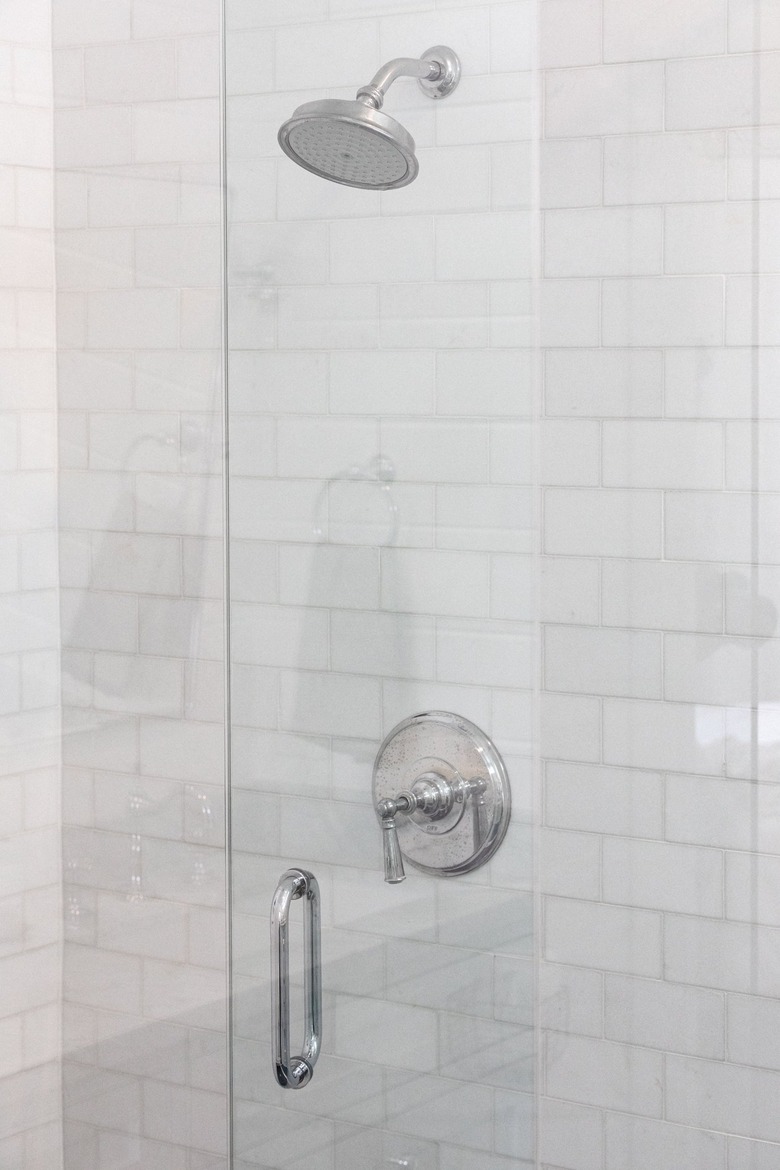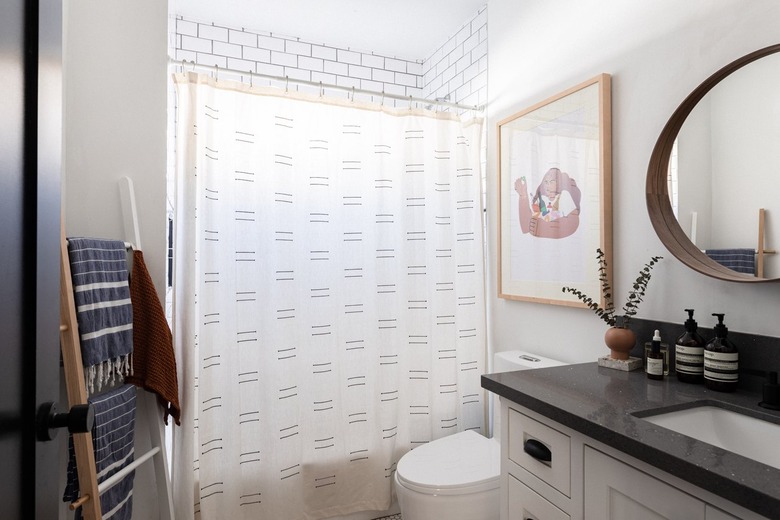How To Clean A Shower
We may receive a commission on purchases made from links.
A hot shower can wash away a long day—but only if you have a clean shower. There's nothing relaxing about staring at soap scum, so you'll want to make sure your shower is clean and ready to go. Fortunately, shower cleaning is one household chore that doesn't have to be difficult or time consuming. You just need the right techniques and cleansers for the job.
How to Perform a General Shower Cleaning
How to Perform a General Shower Cleaning
Before learning how to clean your shower, consider the ways you can perform the task less often. Soap scum, mold and hard water stains occur on shower walls and bases as water dries on them. If you want to stretch the time between shower cleanings, make sure you dry or squeegee your shower after every use.
If you do this after every shower, you'll need less time and elbow grease when your shower is due for a deeper cleaning. When it is time for a deeper general cleaning, follow these steps:
- Fill a spray bottle with equal parts dish soap and white vinegar.
- Spray the shower walls, starting on the left wall of the shower and working your way around. Allow the spray to sit on the walls for five to 10 minutes.
- Again, starting on the left wall of the shower, wipe down your shower walls and give them a good scrubbing with a sponge. If your shower is really dirty, add some baking soda to your sponge before you start for some safe abrasion to make the job easier. Avoid using the scrubby side of the sponge on acrylic showers and tubs.
- Rinse away your cleaning solution. This is easy if you have a showerhead with a detachable sprayer. If you don't, use a bowl or pitcher to cascade water over the shower walls.
- Repeat this process with your bathtub or the base of your shower.
- Dry your shower and tub with a clean microfiber cloth or squeegee.
How to Clean a Shower Drain
How to Clean a Shower Drain
Your drain provides the perfect damp and dark place for bacteria to grow. Giving it a good cleaning once in a while helps keep things sanitary and prevents unpleasant odors from forming.
- Make a paste of baking soda, dish soap and water.
- Spread the paste around the drain and allow it to sit for five to 10 minutes.
- Scrub the area around the drain with a toothbrush, paying special attention to the place where the drain flange meets the bathtub or shower pan.
- Rinse away the cleanser and dry the area.
How to Clean Your Shower Fixtures
How to Clean Your Shower Fixtures
Most of the time, a clean rag and a bit of glass cleaner are all you need to polish your shower's fixtures. If you have hard water, however, you may need to work a bit harder to keep your fixtures looking clean and shiny.
- Mix equal parts vinegar and water in a bowl.
- Dip a cleaning rag into the vinegar and water solution and wipe down your showerhead, faucet and shower controls.
- Clean scale buildup from your showerhead as needed by removing the shower head and soaking it overnight in a water and vinegar mix. If you aren't comfortable removing your showerhead, pour the cleaning mixture into a plastic bag. Place the plastic bag over your showerhead and hold it in place with a rubber band or some duct tape. (Make sure the tape is on the plastic and not the shower arm pipe.)
- In the morning, remove the showerhead from the vinegar solution and rinse it thoroughly.
- Reinstall the showerhead and run water through it to clean any remaining vinegar out of the nozzles.
How to Clean Grout in the Shower
How to Clean Grout in the Shower
It's important to exercise caution when cleaning grout. Many homemade grout cleaning solution recipes use vinegar, but this isn't a good idea because vinegar is acidic. It cleans well, but it can etch delicate tiles and permanently damage them. It can also erode cement-based grout. Instead, use hydrogen peroxide and baking soda to add extra cleaning power to your grout cleaner.
Although it works well to clean grout, this particular formula and process will also tackle any mold or mildew stains in your shower or bathtub.
- Country Living recommends starting with hot water to make your grout cleaning solution. You can then add 1/2 cup of baking soda, 1/4 cup of hydrogen peroxide and 1 teaspoon of dish soap to the mix.
- Spray the solution onto your grout and allow it to sit for a few minutes.
- Scrub the grout with a scrub brush.
- Rinse away the cleaning solution with warm water.
- Consider sealing your grout to protect it from further staining and discoloration.
How to Remove Rust Stains
How to Remove Rust Stains
If you have a bathtub and shower combination based in a steel or cast iron bathtub, you may find rust stains cropping up in your shower. Rusting shower caddies can also cause stains. There are plenty of commercial cleaning product you can try, but some are harsh and could damage your tub's finish. Consider trying a homemade remedy first.
- Pour some lemon juice over the stain.
- Sprinkle salt liberally over the lemon juice.
- Allow the salt and lemon juice to sit on the stain for about four hours, as Merry Maids suggests.
- Scrub the area gently with a soft cloth.
- Rinse away the lemon and salt.
How to Clean the Shower Curtain
How to Clean the Shower Curtain
Occasionally, your shower curtain will need freshening as well. You will also need to pay attention to your shower curtain liner, as these plastic sheets frequently need to be cleaned or replaced due to soap scum or bacterial growth. You may be able to wash your liner along with your shower curtain, however, thereby extending its life.
- Take your shower curtain down and wash it per the directions on the care label.
- Dry the curtain in your clothes dryer or hang it out in the sun to freshen it (cotton curtains may shrink significantly if dried in the dryer).
- Remove your plastic shower curtain liner and lay it flat in your yard.
- Spray the liner with a 50/50 water and vinegar solution and wipe it down.
- If any scum or discoloration remains, wash the liner again using a mixture of oxygenated cleanser (like OxiClean) and hydrogen peroxide.
- Rinse the liner with your garden hose and allow it to dry before rehanging it.


